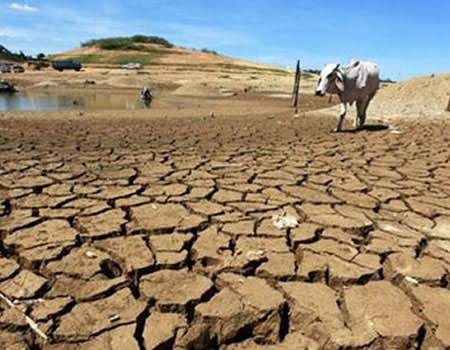BY KHADIJA MUSTAPHA MU’AZU
Climate change is increasingly threatening the agricultural sector in northern Nigeria, a region heavily reliant on farming for food and income. Rising temperatures, unpredictable rainfall, and desertification have disrupted traditional farming practices, reducing crop yields and threatening food security.
For a region already grappling with poverty and insecurity, the consequences of climate change are devastating and demand urgent attention.Northern Nigeria is particularly vulnerable to climate change due to its arid and semi-arid climate.
Over the past few decades, the region has experienced a steady rise in average temperatures and a decline in annual rainfall.
These changes have resulted in longer dry seasons and shorter growing periods, making it difficult for farmers to cultivate staple crops such as millet, sorghum, and maize.
Desertification is another significant challenge. The encroachment of the Sahara Desert into northern Nigeria has degraded farmland, reducing the availability of arable land.
This has forced many farmers to abandon their traditional lands and migrate in search of more fertile areas, leading to increased competition for resources and tensions among communities.
The impact of climate change on agriculture has far-reaching socio-economic implications. Reduced crop yields have led to higher food prices, making it difficult for low-income families to afford basic staples.
The loss of income from farming has also increased poverty and unemployment, particularly among rural populations who depend on agriculture for their livelihoods.
In some cases, this economic hardship has fueled conflicts over land and water resources, further destabilizing the region.
Livestock farming, another critical aspect of northern Nigeria’s economy, has also been affected. Prolonged droughts and dwindling water sources have made it challenging to sustain livestock, leading to significant losses for pastoralists.
This has exacerbated tensions between farmers and herders, often resulting in violent clashes over grazing lands and water points.Efforts to address the impact of climate change on agriculture in northern Nigeria are underway but remain insufficient.
The Nigerian government, in collaboration with international organizations, has launched initiatives such as the Great Green Wall project, aimed at combating desertification through reforestation.
Programs promoting climate-smart agriculture, such as the use of drought-resistant crops and efficient irrigation systems, have also been introduced, but their adoption has been slow due to limited awareness and resources.
To mitigate the impact of climate change on agriculture, a holistic approach is required. Investments in climate-resilient infrastructure, such as dams and irrigation systems, can help farmers adapt to changing weather patterns.
Community-based natural resource management programs can reduce conflicts and promote sustainable farming practices.
Additionally, providing access to affordable agricultural inputs and credit can support farmers in adopting innovative techniques to improve productivity.Climate change poses a significant threat to agriculture and livelihoods in northern Nigeria.
Addressing this challenge requires a coordinated effort from the government, international partners, and local communities. By prioritizing sustainable practices and building resilience, northern Nigeria can safeguard its agricultural sector and ensure food security for future generations.
KHADIJA MUSTAPHA MU’AZU IS A 300 LEVEL STUDENT FROM MASS COMMUNICATION DEPARTMENT BORNO STATE UNIVERSITY, BORNO STATE.












